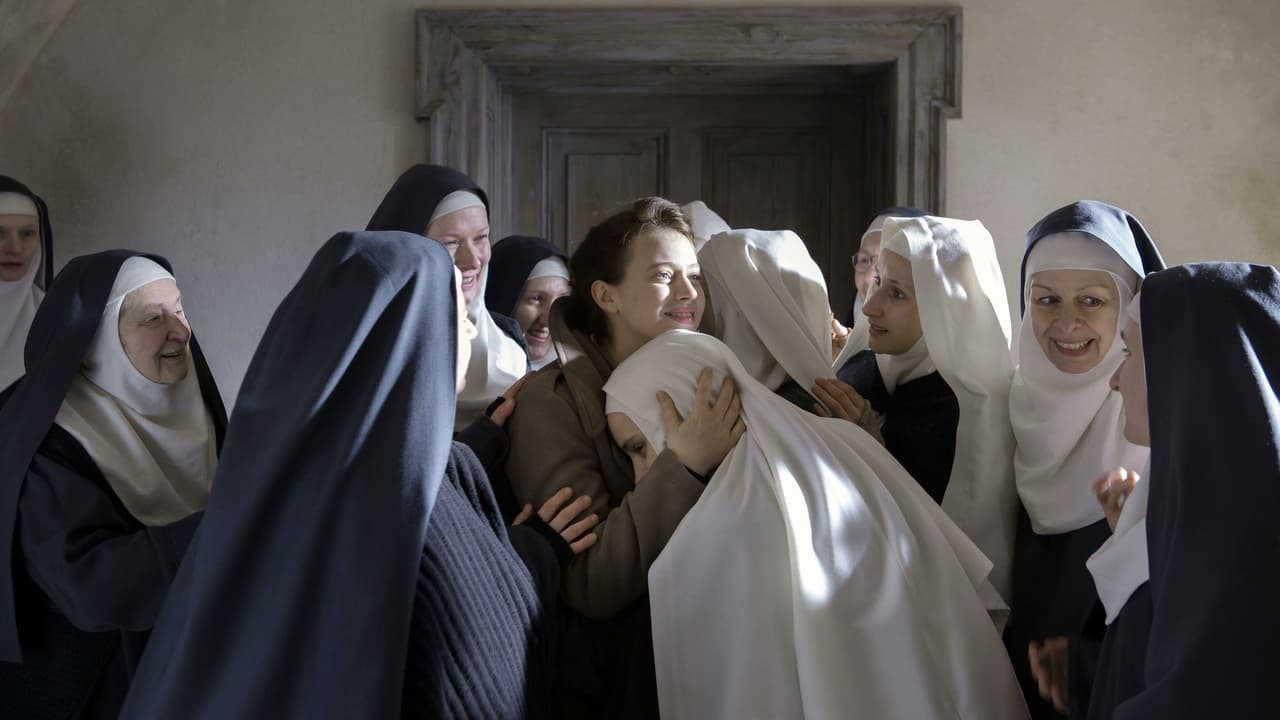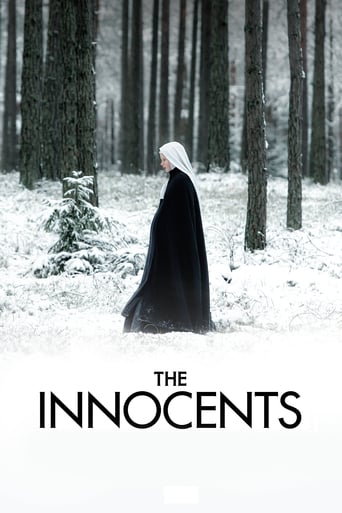

Terrible acting, screenplay and direction.
... View MoreSimple and well acted, it has tension enough to knot the stomach.
... View MoreBlending excellent reporting and strong storytelling, this is a disturbing film truly stranger than fiction
... View MoreThe joyful confection is coated in a sparkly gloss, bright enough to gleam from the darkest, most cynical corners.
... View MoreIn rural Poland just months after the end of World War II, the occupying Nazis have left and occupying Soviets have taken over. Mathilde (Lou de Laage) is a young doctor with the French Red Cross who is assigned to help wounded French soldiers. Maria (Agata Buzek) is a nun from a nearby convent who convinces Mathilde to assist members of her convent in great need of medical help due to a crisis that happened months before.I am being deliberately vague in the synopsis to avoid revealing a shocking spoiler in the film's beginning. I was fortunate not to know this detail and was very moved by the impact when it was revealed. The film is based on a true story. While the premise seems bizarre at first, it makes perfect sense later after one recalls the gruesome historical details of this place and time.Director Anne Fontaine was one of the film's screenwriters along with Sabrina Karine, Pascal Bonitzer, and Alice Vial. While there are some flaws in the story, most of it is very rich and very well executed by Fontaine's austere directing skills.While many individual stories are intriguing, it can be difficult to keep track of the many characters in the convent. In the latter half, there is a shocking action by the Mother Abbess (Agata Kuleza) that doesn't seem to make sense. It is possible to give the benefit of the doubt but there ought to have been an extended monologue in which the character explained her choice of action. There is a brief monologue but this doesn't seem to be enough.Despite these complaints, all other aspects of the story are fascinating. The characterizations of Mathilde and Maria are solidly written and portrayed. They both differ in faith (Mathilde, raised Catholic, is a non-believer) but they are very much alike in that they both risk getting in trouble with their respective organizations in order to answer a higher calling to help those in need. Their unlikely kinship is another enjoyable aspect of the story especially when they put their minds together at the end.There are other powerful scenes in which some of the nuns discuss varying degrees of faith. Some are losing it which is quite understandable under their circumstances. The film also explores broader issues such as having to live with one set of bullying occupiers (the Nazis) only to be liberated and have those bullies replaced with another set (the Soviets). The story also explores Poland's history of anti-Semitism. This is best reflected in the experiences and perspective of Samuel (Vincent Macaigne), a Jewish Frenchman who is Mathilde's senior colleague, friend, and occasional lover.It is tempting to compare this film with "Ida" (2013). They are both Polish films involving nuns and the aftermath of World War II. Kuleza also has a prominent role in both. Despite these similarities, both of these fine films are very distinct in their own ways.
... View MoreThis film is based on true events in Poland. After the end of World War II in 1945, many polish nuns in catholic convent became pregnant one after the other. This revealed that these women were physically abused and raped by Russian army. During that time a communist French nurse,Madeleine Pauliac working for Red Cross came to treat wounded Russian soldiers look after these women. The lady doctor performs a noble task beyond her duty to reduce labour pain, help during them child birth. She secretly visits convent to treat patient nuns, provide medicines,and save many babies. She took risk of her life and from being fired from her job for treating enemy. Nuns had chosen to remain celibate,but become victim of rape and lose virginity. Lead sister in convent tried to keep this secret to avoid their condemnation and dismissal from society. Few babies were sent to their relatives, few were sent to adaptation house. One baby was left abandoned over snow-capped hill to let somebody own it. This movie is excellent art. Visuals, colour schemes are stunning. Costumes of nuns, their paths of celibacy,devotion towards Jesus, sermons recited by them are spiritually blissful. Suffering and outcry of women during childbirth is heartbreaking. Women were looked only as an instrument of sexual gratification, while they were performing exhausting task in cooking, cleaning and other households. This film indirectly raises questions upon inhuman behavior by during war. This film reminded me an Oscar winning film, Ida, based upon nun who chose to devote herself to god.
... View MoreABOUT: Set in Poland, in the aftermath of World War II, a nun seeks the aid of a Red Cross medical volunteer to help tend to her pregnant convent sisters at the risk of scandal and dishonor. REVIEW: "The Innocents" is a very sad yet a precise picture of the place and most of all the people who were and still are being touched by the horrors of war and are trying very hard to keep their faith and regain the reason to move forward in life despite of. Truly, the characters where shown as they struggle in such unbearable circumstances. The film, right from the start was able to establish the tone to convey the general feelings of the characters. Though I have not been present when such events or those similar had happened, it became easier to identify with them and feel emotionally engaged. I credit this to the direction and the cinematography. The film is mostly depicted with sets in snow and moments of deafening silence which for me is perfect because they give the impression of intense feelings of loneliness and hopelessness which are essential to the story being told. Regarding the acting aspect of the film, I felt that every actor/actresses fleshed out their characters by playing the part with the right amount of subtlety and moments of peaks. They were able to exhibit the essential emotions properly and make you empathize with them and feel what they feel easily. These aspects, direction, cinematography, and acting worked well together that I can't seem to detect any flaw within the movie and if there is any, it wouldn't get in the way of how good this movie really is.FINAL WORD: Most people would peg this movie as just another art film and it is so as evident in how well-crafted the movie is. But it's just not that. It's not limited to being an eye candy and does not become solely extrinsic in value and self-indulgent. It is also about a subject of great substance and social interest. While it seems like only a few people had watched the movie (based on IMDb ratings) at this point, "The Innocents" is a good movie; one of the best I have seen with a story that has great emotional appeal this year. It really is a story needed to be told and in my opinion, was given a worthy cinematic treatment. Give it a try.
... View MoreI attended this as part of the BFI season. Festivals always give films extra love, I've noticed, and this is certainly a worthy story, about the fallout of war, in particular told through the story of the aftermath of mass rapes at a convent in Poland.That this packs almost no emotional punch is down almost solely to the writing. In this genre, rounded characters who develop and use of moral dilemma are key and both were noticeably absent here. What we are left with is simply a historical reenactment.Mathilde is the French Red Cross worker who comes to the aid of the nuns to help them give birth to the babies that are the product of the rapes. Her bind is to keep this - and therefore the nature of her aid to the nuns - secret. This is where I feel moral dilemma as a device could have been used more, because her work at the red cross is equally as important and humanitarian and this begins to suffer - but the writing never lets you in on the series of personal revelations Mathilde would have gone through toward the realisation that helping the nuns takes precedence for her. You therefore get no sense of a character arc and this is embodied by the curiously vacant performance of Lou de Lâage. However, its really the script which does not help her.The nuns themselves are not really characters, but two different sets of qualities. The older ones are stoic and taciturn and the younger ones are justifiably innocent and scared. You never get to understand who they are and there is a strange lack of religious context. There is the questioning of faith and God's will, of course. But the world of the Bible, its characters and lessons are their whole universe. How do they view what happened to them? Through the prism of Mary Magdalene? Through Jesus? Through the Book of Job? Their philophising seems to come from an authorial, rather than a character, voice. For a film which evokes this world much more clearly, I really recommend Doubt.There is some very sloppy direction. Early on Mathilde is told off during an operation because of a lack of attentiveness. The doctor yanks down his mask to speak to her. How come he can do this? Is the mask not necessary after all? Why wear it in the first place? Failures of detail here really take me out of a scene.The acting is generally very good and there is some beautiful cinematography. But the writing is lazy and in places so is the direction. For me, this was a missed opportunity to tell a compelling story.
... View More